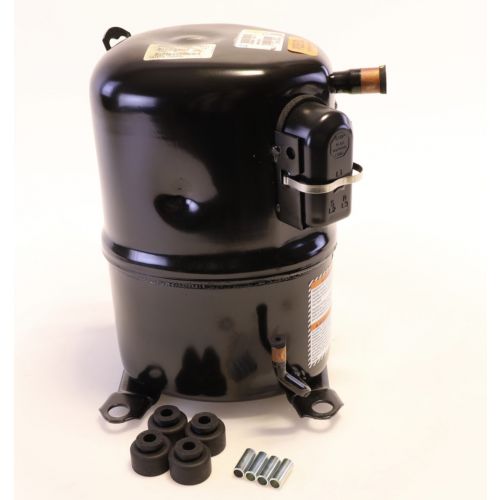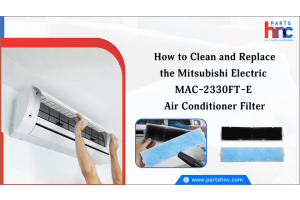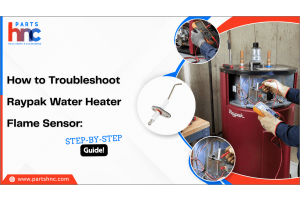Step-by-Step Guide: Troubleshooting Common HVAC Compressor Problems
The compressor plays a critical role in your heat pump system by moving refrigerant to transfer heat between the indoor and outdoor units. When it starts to fail, you may notice poor heating or cooling, rising energy bills, or complete system failure. Addressing these issues early can help avoid expensive repairs and extend the life of your heat pump. This step-by-step guide will assist homeowners and technicians in troubleshooting common problems related to heat pump air compressor parts, understanding what causes them, and apply practical solutions. From startup failures to strange noises or overheating, knowing what to look for can make a big difference. With a little knowledge and routine care, you can keep your heat pump running efficiently and reliably all year long.
Introduction to Air Compressors in HVAC Systems
Air compressors are vital in HVAC systems, especially air conditioners and air source heat pumps. They compress the refrigerant, enabling efficient heat transfer for cooling or heating. Without a properly working compressor, the system can’t maintain the desired temperature or humidity. The air source heat pump compressor plays a key role in this process.
Here’s a breakdown of what air compressors do and why they matter:
-
Refrigerant Compression: In order to prepare the low-pressure refrigerant gas for heat exchange, the compressor compresses it into a high-pressure, high-temperature gas.
-
Circulation of Refrigerant: It enhances the system's ability to absorb and release heat by moving the refrigerant.
-
System Efficiency: The efficiency of the system is maintained by a healthy compressor, which lowers energy use and utility costs.
-
Temperature Control: The compressor enables consistent temperature control by maintaining the refrigerant cycle.
HVAC systems use various types of compressors, such as:
-
Reciprocating Compressors: Common in residential units; they use pistons to compress refrigerant.
-
Scroll Compressors: Quieter and more efficient, often found in modern systems.
-
Rotary Compressors: Compact and reliable, suitable for smaller HVAC units.
-
Screw Compressors: Because of their enormous capacity and efficiency, they are usually utilized in larger commercial systems.
Understanding the role of the compressor is the first step in diagnosing HVAC issues effectively.
Looking for replacement parts to fix your HVAC compressor issues? At PartsHnC, you'll find quality components like capacitors, contactors, and start relays from top brands like Carrier, Goodman, and Trane. Shop now and get the right parts fast to keep your system running smoothly!
Check out this heat pump compressors: a comprehensive guide to learn more about the crucial role air compressors play in HVAC systems.
Common Signs of HVAC Air Compressor Issues
A failing HVAC air compressor can cause performance issues and increase your energy costs. Recognizing real-world warning signs can help you catch problems before they lead to total system failure.
Here are the most common and practical signs of compressor trouble:
-
Warm Air Instead of Cool Air: Warm air blowing from vents despite the system running, indicating compressor weakness.
-
Compressor Won’t Turn On: Compressor fails to start even though the outdoor fan is running, signaling possible electrical faults.
-
Frequent Tripping of Breaker: Circuit breaker trips frequently, often caused by compressor overheating or electrical overload.
-
Clicking or Ticking Noises at Startup: A failing compressor often makes clicking sounds when trying to start but fails to engage.
-
Buzzing or Humming Sounds: Electrical problems or internal pressure build-up can cause unusual humming or buzzing.
-
Moisture or Leaks Around the Unit: Oil or refrigerant leaks can indicate compressor seal or connection failure.
-
System Shuts Down Unexpectedly: Overheating compressors can trigger safety shutdowns to protect the unit.
Addressing these signs early can help prevent system damage and expensive replacements.
Step-by-Step Troubleshooting for HVAC Air Compressors
Early troubleshooting air compressor problems can help avoid expensive repairs and serious breakdowns. Follow these steps to identify common issues and take the appropriate action:
Step 1: Check the Power Supply
Ensure the thermostat is set correctly and the unit is receiving power. Inspect the circuit breaker and fuses to confirm nothing has tripped or blown.
Step 2: Inspect the Thermostat Settings
Verify that the thermostat is set to "cool" and the temperature setting is below the room temperature. Replace batteries if needed and check for display errors.
Step 3: Listen for Unusual Noises
Turn on the system and listen closely. Clicking, buzzing, or grinding noises can indicate electrical issues or internal mechanical damage.
Step 4: Examine Airflow and Filters
Check air filters for clogs and inspect vents for blockages. Inadequate airflow might cause the compressor to overwork and lower cooling effectiveness.
Step 5: Look for Leaks or Moisture
Inspect around the outdoor unit and refrigerant lines for visible leaks, oil spots, or moisture. This could suggest a refrigerant leak or condensation issue.
Step 6: Monitor Compressor Operation
Observe the compressor while the unit runs. If it doesn’t start, starts slowly, or shuts off too quickly, internal or electrical faults may be present.
Step 7: Call a Professional if Needed
If basic checks don’t resolve the issue or if your air compressor stopped working completely, contact a licensed HVAC technician for safe and accurate repair.
By following this air compressor troubleshooting guide, you can quickly identify common issues and take action to keep your HVAC system running smoothly and efficiently.
Check out this guide on common air conditioner compressor issues and fixes for detailed insights on diagnosing and resolving HVAC air compressor problems.
Causes of Air Compressor Malfunctions
Air compressor malfunctions in HVAC systems often result from a combination of electrical, mechanical, and maintenance issues. Knowing the common causes can help you prevent damage and keep your system running smoothly.
-
Electrical Failures: The Compressor may not start or operate irregularly due to damaged wiring, malfunctioning capacitors, or blown fuses.
-
Refrigerant Leaks: Low refrigerant levels from leaks put stress on the compressor, resulting in overheating or ineffective cooling.
-
Mechanical Wear: Components such as pistons, valves, and bearings naturally wear out over time, resulting in reduced compressor efficiency or failure.
-
Blocked Airflow: Dirt, leaves, or debris accumulating around the outdoor unit restricts airflow, causing the compressor to overheat and work harder.
-
Poor Maintenance: Skipping regular inspections and cleaning causes buildup that damages internal parts and reduces compressor lifespan.
-
Overheating: Inadequate ventilation or excessive operating time causes the compressor to overheat, leading to shutdowns or damage.
-
Electrical Overload: Overcurrent due to electrical faults can trip breakers or harm compressor electrical components.
Recognizing these causes early can help resolve issues when your air compressor stopped building pressure and keep your HVAC system running efficiently.
Preventative Maintenance for HVAC Compressors
Regular preventative maintenance is key to keeping your HVAC compressor running smoothly and avoiding costly repairs. Proactive care ensures better efficiency and extends the system’s lifespan.
-
Routine Inspections: Arrange for regular inspections to identify wear, electrical issues, or refrigerant leaks early on and prevent them from getting worse. Early detection helps prevent major breakdowns.
-
Clean the Outdoor Unit: Remove dirt, leaves, and debris regularly from the compressor and condenser coils. Maintaining performance and avoiding overheating require adequate ventilation.
-
Check Refrigerant Levels: Have a professional check the levels of refrigerant and look for leaks. Maintaining correct refrigerant levels ensures efficient cooling and protects the compressor.
-
Test Electrical Components: Inspect capacitors, contactors, and wiring for any signs of damage or wear. Replacing faulty parts early can prevent compressor startup failures.
-
Lubricate Moving Parts: If your system calls for it, lubricate motor bearings and other moving parts. Wear and tear is decreased by proper lubrication because it reduces friction.
-
Replace Air Filters: To preserve ideal airflow and lessen compressor strain, change air filters on a regular basis. System performance and interior air quality are enhanced by clean filters.
-
Track System Performance: Keep an ear out for odd noises while the system is operating and pay attention to how well the cooling is working. Early identification of performance drops can save time and money.
-
Professional Tune-Ups: Make an appointment with a certified HVAC specialist for yearly tune-ups. technician for comprehensive upkeep. To maintain optimal system performance, technicians can test, clean, and modify components.
You can make sure your HVAC compressor remains dependable, effective, and long-lasting throughout all seasons by according to these preventative maintenance guidelines.
When to Call a Professional for Air Compressor Repair
Some HVAC compressor issues can be fixed with simple troubleshooting, but many require professional expertise to avoid costly damage. Maintaining the security and dependability of your system requires knowing when to call a technician.
-
No Power or Response: If the compressor won’t start despite checking power and the thermostat, it likely has electrical issues that need a professional.
-
Unusual Noises: Buzzing, rattling, or grinding sounds usually indicate mechanical problems requiring expert repair.
-
Frequent Cycling or Overheating: Compressor cycling on/off or overheating often signals refrigerant or motor issues needing technician attention.
-
Leaks or Moisture: Visible refrigerant leaks or moisture are hazardous and need immediate professional repair.
-
Poor Cooling Performance: The System runs but doesn’t cool well, indicating the need for a detailed inspection and repair.
-
Electrical Breaker Trips: Repeated breaker trips suggest electrical faults that require professional diagnosis and fixing.
-
Failed Capacitors or Motors: Diagnosing and replacing these components safely requires technical skills and equipment.
Calling a licensed HVAC technician ensures proper repair, safety, and long-term reliability of your air compressor system.
Conclusion: Ensuring Reliable HVAC Compressor Performance
To ensure reliable HVAC compressor performance, regular maintenance and timely repairs are essential. Understanding key air compressor parts, such as pistons, valves, and capacitors, helps identify issues early. System efficiency is increased, and expensive malfunctions are avoided with proper maintenance. Learning how to troubleshoot air compressor problems like electrical faults or airflow issues supports proactive maintenance. Maintaining your HVAC system's functionality requires being aware of warning indicators. Comfort and long-term worth are increased by spending money on high-quality parts and expert care. These steps lead to a more durable and efficient cooling solution for any space.
FAQs
What are the most common causes of HVAC compressor failure?
The most common causes are electrical faults, refrigerant leaks, mechanical wear, and poor maintenance. These issues can cause overheating and reduce the compressor’s efficiency.
How often should an air compressor be serviced in an HVAC system?
An air compressor should be serviced at least once a year to maintain optimal performance. Regular servicing helps detect problems early and extends the system’s lifespan.
Can I troubleshoot HVAC compressor issues myself?
You can perform basic troubleshooting, like checking the power supply and thermostat settings. However, for more complex issues, it’s best to hire a professional technician.
What are the warning signs that my air compressor needs replacement?
Warning signs include frequent overheating, strange noises, and failure to start or build pressure. If problems persist despite repairs, it’s likely time to replace the compressor.
 Loyalty Program
Loyalty Program











